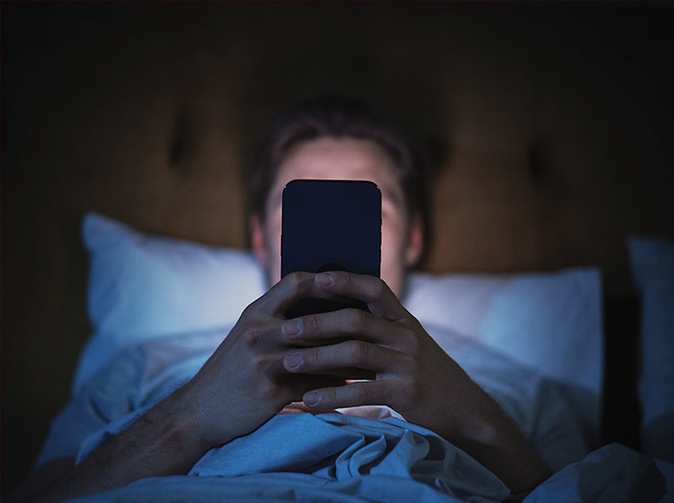Digital Detox For Better Sleep: How To Unplug And Unwind Before Bed
In our fast-paced, digitally driven world, we find ourselves in front of screens all day long, right up to the time we go to bed. All that constant exposure to computer screens, tablets, phones, and other devices can impact the quality of sleep we get, particularly if we don't put the devices away early enough. As we head into spring, when everything is coming back to life, why not breathe life into your sleep by enforcing a little digital detox?

What is the Impact of Screen Time on Quality Sleep?
There have been numerous studies highlighting the adverse impact excessive screen time has on sleep quality. The blue light emitted from screens can suppress melatonin production, a hormone responsible for regulating your sleep-wake cycles, among other things. When your melatonin production is altered, it can make it harder to fall asleep. It can also lead to less time for restorative sleep and, overall, poor sleep quality.
On top of the unique light emitted from screens and the suppression of melatonin, engaging in stimulating activities before bedtime, such as watching television, playing video games, or doom scrolling, can make it harder for your brain to slow down, relax, and enter sleep.
Set Goals for Reducing Screen Time Before Bed
Step one in your digital detox is to establish a plan. If you don't have a destination, you'll never get there, right? So, what can you do to set healthy habits and get yourself ready for better sleep?
- Establish a digital curfew
It is a good idea to set a specific time when you'll power down all your electronics at night. Your digital curfew lets your brain unwind and signals your body to get ready for sleep. A good goal to set is to stop using screens at least an hour before bedtime. - Start a relaxing bedtime routine
The hour before bedtime is essential for getting you into a state of relaxation. When you have a routine, it lets your body know that it is time to prepare for sleep. There are many relaxing activities you can enjoy, such as reading a book, taking part in a calming hobby, stretching, breathing, taking a bath, or listening to music. The goal is to wind down. - Make your bedroom a tech-free zone
It is hard to make a habit to turn off your electronics. A slightly easier approach is to designate your bedroom as a tech-free zone. If that is a doable solution, all you must do is keep your devices out of this important space and reserve it only for its purpose: getting restful sleep. - Apply blue light filters
If you find it difficult to eliminate screen time in that hour before bed, consider using blue light filters for your devices. Your smartphone or computer may even have a built-in feature that reduces blue light emissions. These filters can help you minimize the impact of blue light on your melatonin production.
Changing your lifestyle can be difficult, but prioritizing quality sleep brings numerous benefits.
The Benefits of Quality Sleep
Prioritizing quality sleep is essential. For young people, it supports growth and development. Adults also need good sleep for many health benefits. Here are just a few of those benefits.
- Enhances memory consolidation and learning
- Reduces anxiety, irritability, and mood swings
- Promotes emotional resilience
- Increases cardiovascular health, lowering the risk of heart disease and hypertension
- Helps maintain healthy blood pressure
- Lowers the risk of chronic health conditions, such as diabetes
- Helps to regulate the production of key hormones, such as cortisol and insulin
- Helps to reduce the signs of aging
We could go on, but you get the point. Sleep is far more important than most give it credit. Ramp up your quality of sleep with a few simple alterations to your bedtime routine. If you feel like you're not seeing results, there could be an underlying condition, such as sleep apnea. You can find out by ordering a home sleep test. It is a non-intrusive way to check your breathing, oxygen levels, and more.
Find a provider in your area or order an in-home test and take it yourself. At Sleeptest.com, we have resources for both. Sleep is essential, and a home sleep study is convenient, fast, and affordable. Get yours today.

Love can be fiery and passionate or sweet and steady—but snoring? Not so much. Whether you're in the honeymoon phase or years into your journey together, snoring can shake up a relationship. With Valentine’s Day around the corner, let’s take a fun look at how snoring can impact your love life.

New Year’s resolutions are made with the best intentions—hitting the gym, eating healthier, and committing to self-improvement. Millions of people dive in, signing up for memberships, filling their fridges with fresh produce, and stacking self-help books on their nightstands. But as the months go by, workouts slow down, nutritious meals are replaced with convenience foods, and those books remain unread. Why do so many resolutions fail? One major factor that often gets overlooked is sleep. Poor sleep can derail motivation and energy, making it harder to stick to your goals. Let’s explore how a sleep test could be the key to staying on track.




